|
|
|
Sort Order |
|
|
|
Items / Page
|
|
|
|
|
|
|
| Srl | Item |
| 1 |
ID:
140242
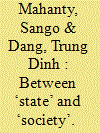

|
|
|
|
|
| Summary/Abstract |
Maintaining a liveable environment in Vietnam's polluted craft villages is a daily challenge for state authorities and residents. Neighbouring urban populations demand that the state effectively curtails and manages pollution, while local residents prioritise their livelihoods and routinely flout regulations. The commune official, tasked with the seemingly impossible task of environmental regulation, occupies a fraught position, torn between the imperatives and constraints of craft producers and state regulatory demands. This study of water pollution in northern Vietnam's craft villages finds that commune officials' conflicted role in environmental governance is a central factor in the failure of the current environmental governance regime, and reflects the internally conflicted nature of the Vietnamese state.
|
|
|
|
|
|
|
|
|
|
|
|
|
|
|
|
| 2 |
ID:
176751
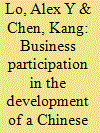

|
|
|
|
|
| Summary/Abstract |
Businesses are often involved in climate change governance and form networks to influence policy. They are evidently important for the implementation of market-based emission trading schemes and their general role has been widely discussed. However, there is a variety of business networks, and their specific structures and organizing styles are poorly understood, particularly in the non-Western context. This study identifies the ways in which one of these networks was organized and performed a governing function in the development of an emission trading scheme in China. We found that the policy development was neither highly top-down nor bottom-up, and business participation was hierarchical. Key governing roles were effectively performed by a small group of collaborating business organizations, which were essentially public-private hybrid actors and able to build linkages between the top and the bottom levels. The findings indicate the decisive qualitative differences in business leadership in the development of market-based policy.
|
|
|
|
|
|
|
|
|
|
|
|
|
|
|
|
| 3 |
ID:
189976
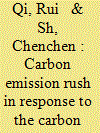

|
|
|
|
|
| Summary/Abstract |
China has announced ambitious dual-carbon targets to peak carbon emissions by 2030 and achieve carbon neutrality by 2060. However, due to regional differences and lack of accurate emission monitoring data, local governments have been given greater autonomy to achieve these targets. Based on semi-structured interviews and document analysis on emission peak campaigns in inland regions, this article identifies one local game strategy – ‘Dauling Dragon’ (木翼双龙) whereby local governments prioritize high emission projects to be completed by 2030 in order to create a margin for future development, a phenomenon known as ‘carbon rush’ (碳冲锋). The article explores the consequences and antecedents of such a strategy through the lens of environmental authoritarianism. It also makes a theoretical contribution to the conceptualization of the Dauling Dragon strategy, by focusing on its effects on local environmental implementation. Findings from our case study show that China’s climate ambitions, especially its long-term carbon neutrality goal, faces local political obstacles.
|
|
|
|
|
|
|
|
|
|
|
|
|
|
|
|
| 4 |
ID:
087486
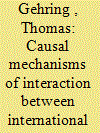

|
|
|
|
|
| Publication |
2009.
|
| Summary/Abstract |
This article develops a conceptual framework for the systematic analysis of the interaction between international institutions as a first step towards building a theory of international interaction. It examines how international institutions may exert causal influence on each other's development and effectiveness and suggests that four general causal mechanisms can elucidate the distinct routes through which influence travels from one institution to another. Institutional interaction can thus rely on transfer of knowledge, commitments established under an institution, behavioural effects of an institution, and functional linkage of the ultimate governance targets of the institutions involved. The article also puts forward hypotheses about the likely effects of specific types of institutional interaction for governance within the international system. The causal mechanisms and types of interaction are mutually exclusive models that help analyse real-world interaction situations. They may also serve as a basis for the systematic analysis of more complex interaction situations.
|
|
|
|
|
|
|
|
|
|
|
|
|
|
|
|
| 5 |
ID:
087494


|
|
|
|
|
| Publication |
2009.
|
| Summary/Abstract |
This article develops a conceptual framework for the systematic analysis of the interaction between international institutions as a first step towards building a theory of international interaction. It examines how international institutions may exert causal influence on each other's development and effectiveness and suggests that four general causal mechanisms can elucidate the distinct routes through which influence travels from one institution to another. Institutional interaction can thus rely on transfer of knowledge, commitments established under an institution, behavioural effects of an institution, and functional linkage of the ultimate governance targets of the institutions involved. The article also puts forward hypotheses about the likely effects of specific types of institutional interaction for governance within the international system. The causal mechanisms and types of interaction are mutually exclusive models that help analyse real-world interaction situations. They may also serve as a basis for the systematic analysis of more complex interaction situations.
|
|
|
|
|
|
|
|
|
|
|
|
|
|
|
|
| 6 |
ID:
155668
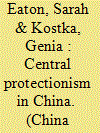

|
|
|
|
|
| Summary/Abstract |
This article examines the so-called “central State Owned Enterprise (SOE) problem” in China's environmental governance system, namely central SOEs' defiance of environmental regulation. We present evidence showing that, in the last decade, central SOEs have been the source of a large number of serious pollution incidents and have often failed to comply with environmental guidelines and regulations. Central SOEs in the electricity generation and oil and gas industries are particularly culpable, with six firms alone accounting for 62 per cent of all 2,370 reported violations (2004–2016). We argue that a combination of “central protectionism” of state-owned national champions and insufficient regulatory capacity in the environmental bureaucracy have provided state firms under central management with both incentives and opportunities to shirk on environmental regulations. Yet, while the institutions of central protectionism are deeply rooted, countervailing forces within the complex Chinese state are also gaining momentum. In spite of the considerable regulatory challenges, officials in the environment bureaucracy display increasing resolve and ingenuity in trying to strengthen their enforcement capacity.
|
|
|
|
|
|
|
|
|
|
|
|
|
|
|
|
| 7 |
ID:
155663
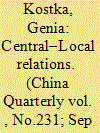

|
|
|
|
|
| Summary/Abstract |
Recent literature on environmental governance in China frequently ascribes blame for China's environmental problems to sub-national governments' lax environmental enforcement. Such research implicitly assumes that more central control would lead to better results but, as yet, the role of the centre in environmental governance remains underresearched. In the context of the current phase of recentralization, this article studies central and local interests, capacities and interactions across policy issues and government agencies. By “bringing the centre back” into the study of central–local relations in China, we examine both where such recentralization has in fact occurred and whether such recentralization efforts have improved environmental outcomes. We argue that centralization does not improve outcomes in every case. Further, central and local levels of governance are not as different as they might seem. Indeed, there are significant areas of overlapping interests and similar patterns of behaviour, both positive (enforcement) and negative (shirking), between central and local administrations. The results draw an empirically and theoretically rich picture of central–local relations that highlights the innate complexity of China's environmental governance patterns during the current phase of recentralization.
|
|
|
|
|
|
|
|
|
|
|
|
|
|
|
|
| 8 |
ID:
120209
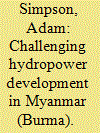

|
|
|
|
|
| Publication |
2013.
|
| Summary/Abstract |
Although general elections in Myanmar (Burma) in November 2010 have transformed the political landscape, many of the characters remain the same. While there is evidence of incremental domestic political openings many of the political constraints that existed during military rule remain in force. As a consequence of decades of military authoritarian governance and civil conflict, it is Myanmar's contested ethnic borderlands that have been the important locales for the development of environmental movements, despite increased recent domestic activity. This article analyses a case study of the largely cross-border campaign against hydropower dams on the Salween River in Myanmar and finds that through the suppression of opposition and dissent at home the regime has stimulated the creation of an 'activist diaspora', a dynamic transnational community of expatriates who engage in environmental activism beyond the reach of the regime. Due to their relative freedom on the border and in Thailand this community has developed expertise and international networks that have proved crucial in communicating the social and environmental impacts of hydropower development in Myanmar to the international community. Through increased cooperation with an expanding domestic civil society this established activist community is stimulating improved environmental governance of hydropower development and simultaneously assisting in the creation of a more open and democratic Myanmar.
|
|
|
|
|
|
|
|
|
|
|
|
|
|
|
|
| 9 |
ID:
134309
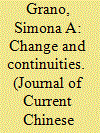

|
|
|
|
|
| Summary/Abstract |
In representative governments, a healthy turnover of power among ruling parties is viewed as a critical sign of democratic principles. In a political environment where voters’ opinion is the key political driver, the greatest challenge facing the NGO community is often that environmental concerns only represent secondary aspects of the policy-making process. This article focuses on the transformations (or lack thereof) in Taiwan’s environmental governance, under different political parties, particularly during the past few years. I begin with an overview of the key issues that have characterised Taiwan’s environmental movement and its battles, starting with the democratic transition of the mid-1980s, before focusing on two developmental projects – Taiwan’s eighth petrochemical plant and fourth nuclear power facility – to bring to light the most significant changes and continuities in the environmental-policy realm. I pay special attention to the post-2008 period and the ensuing renaissance experienced by the environmental movement, among others. The final section considers the consequences of the KMT’s second elect-oral victory – in January 2012 – for environmental policies and, in light of the article’s findings, summarises what has changed and what has consistently remained the same under different ruling parties.
|
|
|
|
|
|
|
|
|
|
|
|
|
|
|
|
| 10 |
ID:
146887


|
|
|
|
|
| Summary/Abstract |
For more than two decades, under the imperative of ‘developing the country at all costs’, local governments in China have allowed developers and industrialists to set up polluting industries which have had deleterious effects on citizens’ health and the natural environment. However, China appears to have entered a new phase of determined and concerted efforts on the part of both the authorities and the public to tackle environmental problems. The articles in this special issue of China Information examine the main strengths and weaknesses of China’s current system of environmental governance. The central questions linking the case studies reported here are concerned with whether and how environmental policies formulated at the central level are implemented at the local level and how different agents and interests, making use of the available legislative means, influence this implementation process. Engaging a range of political, economic, social and cultural perspectives, the five contributions in this collection concentrate on two broad issues: resolution mechanisms for public participation in environmental governance and the actual enforcement of environmental regulations.
|
|
|
|
|
|
|
|
|
|
|
|
|
|
|
|
| 11 |
ID:
125257
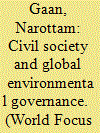

|
|
|
|
|
| Publication |
2013.
|
| Summary/Abstract |
The relation between civil society and environmental governance is not new. A number of developed states have introduced systems of green house gas emissions controls, but policy experience in this area is barely fifteen years old. Initiatives around adaptation are newer still. Thus societies are only beginning to learn what approaches are more or less promising. The power of ideas and the possibility of re-defining what is considered 'normal', 'possible' and 'acceptable' is often neglected in policy discussion. An example of power of ideas to shift policy frames is provided by the turn towards free markets and away from state provision that occurred in 1980s. Over the course of decades reforms aimed a reining back government and encouraging market growth dramatically altered expectation about boundaries of public- private economic activities-that is of civil society in broader sense.
|
|
|
|
|
|
|
|
|
|
|
|
|
|
|
|
| 12 |
ID:
178172
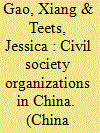

|
|
|
|
|
| Summary/Abstract |
This article examines how civil society organizations navigate local government to secure more inclusive environmental governance. Based on an in-depth case study of water governance in Zhejiang Province between 2012 and 2018, we find that Green Zhejiang, a civil society organization, exercised informal power to hold the local government accountable based on two strategies: mobilizing citizens to collect information on water pollution and strategically leveraging the authority of provincial government to find citizen-focused solutions. Most existing studies foreground one stage of the policy process – advocacy in the agenda-setting phase, policy entrepreneurship during the design phase, or monitoring during the implementation phase; however, we examine strategies of civil society organizations throughout this policy lifecycle. With this approach, we are able to analyse the strategic interactions between different levels of the government and civil society organizations and locate the positive outcomes and limits under the current governance system. Despite policy successes, Green Zhejiang still acts informally, which limits long-term effectiveness. However, incorporating citizens into public administration in a meaningful way requires sharing policymaking power formally, and thus far, local governments are only willing to share power in an ad hoc and informal way. More institutionalized citizen participation is necessary to develop innovative solutions to the severe environmental degradation in China.
|
|
|
|
|
|
|
|
|
|
|
|
|
|
|
|
| 13 |
ID:
141097
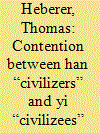

|
|
|
|
|
| Summary/Abstract |
During field research on environmental governance in the Liangshan Yi Autonomous Prefecture in 2012, the author studied the Chinese state's efforts to promote its agenda and “civilizing mission,” the resistance of local Yi people to both, and the resulting clash of discourses on environmental protection. To understand the nature and mechanisms involved in this conflict, the author focuses on the state's “civilizing mission” in light of Foucault's power concept. The article examines two issues: 1) the strategies by which the central state exerts power and asserts its policies in a minority area, i.e. how it attempts to steer the behaviour of local cadres in order to implement its modernization concept, and 2) whether and to what degree it makes a difference that the researched area is a “minority” (Yi) area. To answer these questions, one county in the prefecture was taken as a case study. Furthermore, this article continuously refers to the policy field of environmental governance to substantiate the thesis of a civilizing project conducted by the centre.
|
|
|
|
|
|
|
|
|
|
|
|
|
|
|
|
| 14 |
ID:
128524
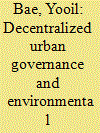

|
|
|
|
|
| Publication |
2013.
|
| Summary/Abstract |
This paper explores how decentralization has created a "local political arena" and has been transforming governance in the environmental management sector in South Korea. Korea has been known as a developmental state where the strong central government and businesses have conspicuously dominated during most of its industrialization period. Yet, the deepened democracy, global competitiveness and fiscal austerity have pressured central political stakeholders to devolve highly centralized functions and authority to local bodies since the mid-1990s. The building of democratic institutions at the local level, including directly elected mayors and city councils, has created room for local politics and diminished central political leverage over local affairs. The national economic crisis has highlighted the inefficiency of the centralized system and encouraged further administrative and fiscal decentralization under the democratic governments. In this issue image_86_4_Baecontext, while the central government and big businesses continue to have a significant say in policy making, local executives, with their expanded decisional authority and resources, are trying to improve the images of their cities and to take responsibility for promoting urban economies and improving quality of life in the age of trans-border links and competition. This paper analyzes the case of Ulsan, where Hyundai and several other conglomerates are located and which has been a symbol of state-led industrialization during most of the development period. Despite the large role played by the centre in the development of Ulsan, the empowered mayor of the city has successfully turned citizens' attention to post-industrial aspects of governance for ensuring the future competitiveness of the city in global markets by orchestrating collaborative implementation of environmental policies. The paper explores how this governance shift in Ulsan has led successful collaborative environmental change by mobilizing local businesses, civic organizations and general citizens who might not have been interested in the making of an "environment-friendly city
|
|
|
|
|
|
|
|
|
|
|
|
|
|
|
|
| 15 |
ID:
110046
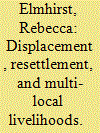

|
|
|
|
|
| Publication |
2012.
|
| Summary/Abstract |
This article examines shifting attitudes toward rural migrants in Lampung Province, on the Indonesian island of Sumatra, in the context of a history of enclosure, commercial expansion, and dispossession. The author examines how contemporary multi-local livelihoods in Lampung reflect an adaptation to the vulnerabilities associated with being a migrant, as people position themselves to qualify for livelihood resources. The author's interpretation draws on Michel Foucault's analysis of the production of governable subjects and, in particular, norms of conduct that produce subjectivities and identities that "fit." The article explores how different policy phases associated with environmental governance in Lampung have created contrasting positionings and norms of conduct for migrants, as they have been defined, on the one hand, as pioneer entrepreneurs, bringing progress to Indonesia's hinterland, and, on the other, as forest squatters, threatening the cultural and ecological integrity of the province. The author suggests that rural migrants have attempted to resolve their problematic positioning through multi-local livelihoods, which combine access to nonlocal income through temporary migration with the maintenance of a foothold that signals belonging and legitimate entitlement to state resources.
|
|
|
|
|
|
|
|
|
|
|
|
|
|
|
|
| 16 |
ID:
192739


|
|
|
|
|
| Summary/Abstract |
Accurately recognizing the impact and mechanism of PM2.5 on firms is essential for China to achieve both the reduction of PM2.5 and economic growth. Based on the differing levels of PM2.5 concentration between both sides of the 800 mm isoline, we construct a quasi-natural experiment to investigate the impact of PM2.5 on firm evolution and regional economic efficiency. We further evaluate the role of government governance in achieving both PM2.5 reduction and regional economic efficiency improvements simultaneously. Results indicate that M2.5 disturb the process of firm evolution and influences regional economic efficiency through different effects. More importantly, the results show that in regions with strong governance, reducing PM2.5 could improve macroeconomic efficiency without hampering economic growth. In contrast, regions with weak governance tend to experience an increase in PM2.5 severity as economic growth advances. The evidence presented in this paper on the relationship between PM2.5 and economic development provides a new perspective to formulate policies for policymakers.
|
|
|
|
|
|
|
|
|
|
|
|
|
|
|
|
| 17 |
ID:
116490
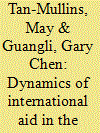

|
|
|
|
|
| Publication |
2012.
|
| Summary/Abstract |
Environmental degradation in China, intensified by open-door reforms and industrialization, has been increasing at an alarming scale. Domestically, environmental governance has been poor, often due to institutional constraints and lack of "good practices." However, recently there have been studies on how the "foreign factor" might have profound positive effects on capacity building in China and how international actors could lead to the successful introduction of good environmental governance. In this article, we present a study of a successful case: the World Bank Global Environmental Facility Cixi Wetlands project in Ningbo, China. The article examines the following: (a) the unique local context enabling the diffusion of international norms; (b) the factors which contribute to the World Bank's leverage role in restructuring local project governance; and (c) the changes in local environmental governance arising from the Bank's involvement. By evaluating this project, the article will demonstrate how the World Bank managed to introduce and socialize local actors into project-specific policy dialogues and procedures that enhanced local compliance with its international practices and standards.
|
|
|
|
|
|
|
|
|
|
|
|
|
|
|
|
| 18 |
ID:
186105


|
|
|
|
|
| Summary/Abstract |
This article provides empirical evidence of the emergence of new private governance forms through three case studies: transboundary air pollution, green supply chain, and energy transition in Northeast Asia. This article also refers to private governance theories discussed in the context of global environmental governance. Consistent with the private authority theory, entrepreneurs with vast expertise and capacity to provide useful information and practices have emerged. They allow stakeholders to cooperate in regional environmental sustainability under the conditions of weak or no focal institutions and heterogeneous state preferences. This observation is consistent with the global trend of environmental governance, which is shifting from regulatory-based to goal-setting governance. As global partnership theory suggests, hybrid forms of private governance, including various local- to global-level public–private partnerships, emerge across the cases. However, these forms of governance are still in the embryonic stage, where their functions of private authority are not fully developed. These insights challenge the predominant view on the limited roles of nonstate actors in building regional environmental governance in Northeast Asia as discussed in the existing literature.
|
|
|
|
|
|
|
|
|
|
|
|
|
|
|
|
| 19 |
ID:
146891
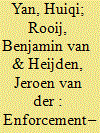

|
|
|
|
|
| Summary/Abstract |
This article, in a study of amoral cost–benefit analysis, legitimacy and capacity to obey the law, seeks to understand why Chinese farmers obey or break pesticide rules. It uses data gathered through intensive fieldwork at a local level, including interviews with 31 pesticide experts and officials and 119 vegetable farmers in central China. It uncovers an enforcement–compliance paradox: a situation where law enforcement concentrates exactly on those rules that are least likely to be broken and on those regulated actors who are most likely to comply. It finds two explanations. First, enforcement policy simply may not be aware of which rules are more likely to be complied with and which regulated actors are more likely to comply even when there is limited deterrence. Second, technocratic risk-averse enforcement policy may be oriented towards those rules and actors for which violation – theoretically – results in the greatest damage, not towards those rules that are more likely to be broken and those actors who are more likely to break them.
|
|
|
|
|
|
|
|
|
|
|
|
|
|
|
|
| 20 |
ID:
085858
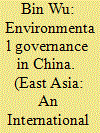

|
|
|
|
|
| Publication |
2008.
|
| Summary/Abstract |
Facing common challenges and dilemmas in climate changes, ecosystem degradation and sustainable development, the term environment governance has become increasingly popular and attracted the attention of policy makers, the public, and civil society organisations world-wide.
|
|
|
|
|
|
|
|
|
|
|
|
|
|
|
|
|
|
|
|
|